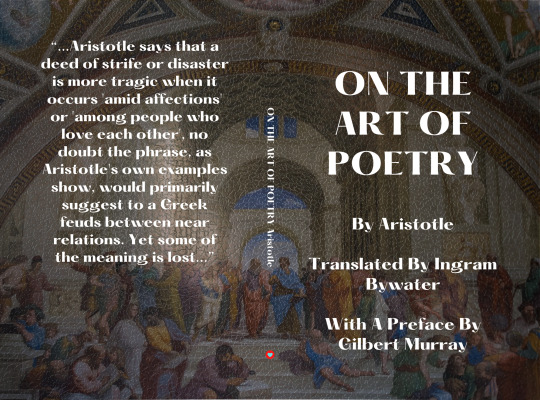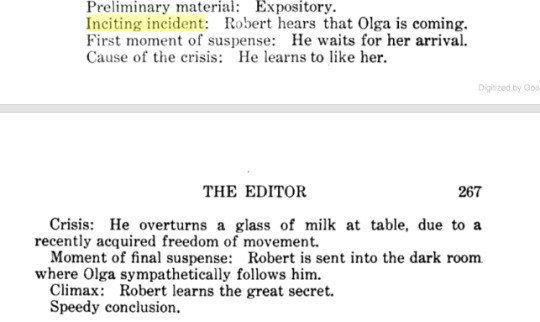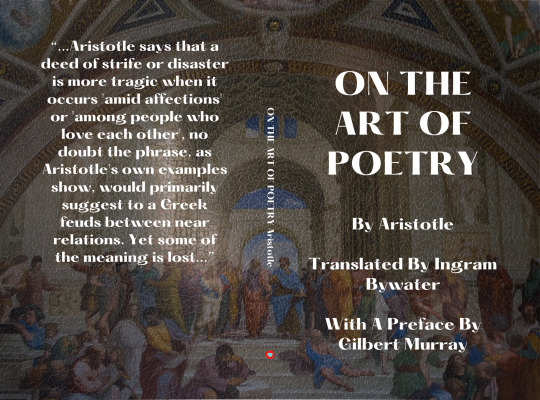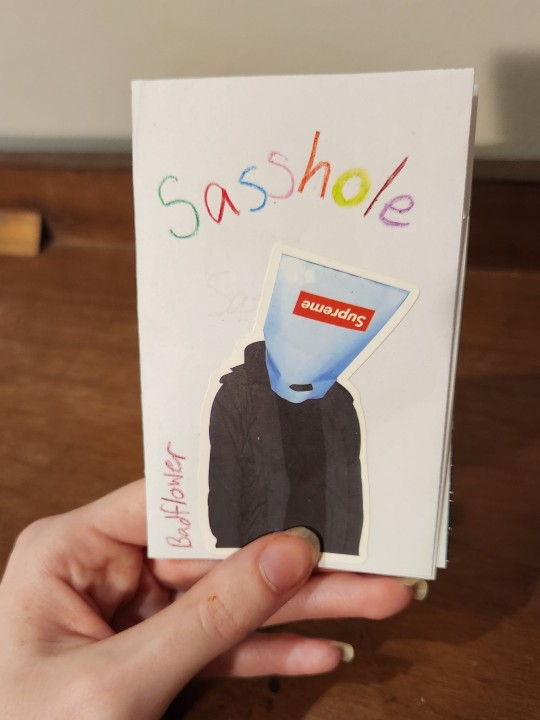#Dramatic structure
Text
Delving into Poetic Wisdom: A Review of "On the Art of Poetry" by Aristotle

Aristotle's "On the Art of Poetry," translated by Ingram Bywater, stands as a seminal work in literary criticism, offering profound insights into the nature and function of poetry that continue to resonate with readers and scholars alike. Written in the 4th century BCE, this treatise serves as a comprehensive examination of the principles and techniques that underlie the creation of poetry, providing valuable guidance for poets and readers alike.
At its core, "On the Art of Poetry" is a testament to Aristotle's keen intellect and analytical prowess. In this work, Aristotle explores the various elements that contribute to the effectiveness of poetry, including plot, character, diction, and spectacle. Through his systematic analysis, Aristotle seeks to uncover the universal principles that govern the art of poetry, shedding light on its essential nature and its role in human society.
One of the most compelling aspects of "On the Art of Poetry" is Aristotle's emphasis on the importance of mimesis, or imitation, in poetry. According to Aristotle, poetry is a form of imitation that seeks to represent the actions, emotions, and experiences of human life. Through the skillful use of language and imagery, poets are able to create a vivid and lifelike portrayal of the world, inviting readers to engage with their work on a profound emotional and intellectual level.
Moreover, "On the Art of Poetry" offers valuable insights into the principles of dramatic structure and the role of catharsis in tragedy. Aristotle argues that tragedy is a form of poetry that evokes feelings of pity and fear in the audience, leading to a purgation or cleansing of these emotions. Through the depiction of the fall of a tragic hero, tragedy allows audiences to confront their own mortality and the fragility of human existence, ultimately leading to a deeper understanding of the human condition.
In addition to its exploration of tragedy, "On the Art of Poetry" also examines the principles of comedy and epic poetry, providing valuable guidance for poets working in these genres. Aristotle discusses the importance of unity of plot, character, and theme in epic poetry, as well as the role of humor and satire in comedy. Through his analysis, Aristotle highlights the diversity of poetic forms and the unique challenges and opportunities that each genre presents to the poet.
In conclusion, "On the Art of Poetry" by Aristotle is a timeless classic that continues to inspire and enlighten readers with its profound insights into the nature of poetry. Aristotle's systematic approach to literary criticism, coupled with his keen observations and analytical rigor, make this work an indispensable resource for anyone interested in the art of poetry. With its timeless wisdom and enduring relevance, "On the Art of Poetry" remains a cornerstone of literary theory and a testament to the enduring power of poetic expression.
Aristotle's "On the Art of Poetry," is available in Amazon in paperback 12.99$ and hardcover 18.99$ editions.
Number of pages: 116
Language: English
Rating: 10/10
Link of the book!
Review By: King's Cat
#Aristotle#Poetry#Literary criticism#Mimesis#Imitation#Dramatic structure#Tragedy#Catharsis#Comedy#Epic poetry#Unity of plot#Characterization#Diction#Spectacle#Poetics#Aesthetic principles#Greek literature#Philosophical discourse#Aristotle's theory#Literary analysis#Poetic form#Emotion#Human experience#Morality#Ethics#Aesthetics#Universal principles#Literary genres#Rhetoric#Imagination
2 notes
·
View notes
Text
Origin of the Coinage of “Inciting Incident”
Inciting incident is likely, as an idea from Gustav Freytag. I established, this already. This kicked around with other writers who refused to give him credit. But the exact phrase and coinage of “Inciting Incident” is unfortunately from a very, very racist source. I suppose I shouldn’t be surprised, but I had a good run recently with you know, reading Brecht, and then the Rev Jesse Ketchum Brennan.
I asked for further help to find this (a Division of NYPL), because I was having trouble.
And then I thought I was out of the woods... and then clicked the link and boom. WTF.
I’m not going to eat my own words where I say something like I’m not going to present it to you... because then we don’t describe how problematic this is.
What I’m going to do is slap it with a
CONTENT WARNING: Racism
But for my own mental health and those of others, I’m refusing to screen cap the extremely racist portion. Describing why it’s racist, will also sound racist, so... ummm... I’m also refusing to do that work. Generally racist, but probably especially racist towards Indigenous peoples. And NO, it was not the times. It was 1913. Civil rights movement had LONG started.
I’m going to screen cap and type up the description portion. (Which is tolerable). I will link the original, but be in a good place and brace yourself before you click. The first paragraph is a doozy and it’s a long time before it gets better: https://books.google.com/books?id=US8DAAAAYAAJ&pg=RA2-PA266&dq=%22inciting+incident%22&hl=en&newbks=1&newbks_redir=0&sa=X&ved=2ahUKEwiitr2q0ff8AhW7FVkFHXAFBjgQ6AF6BAgHEAI#v=onepage&q=%22inciting%20incident%22&f=false (You have to scroll up to see the beginning of the story)

Text
Preliminary material: Expository.
Inciting incident: Robert hears that Olga is coming.
First moment of suspense: He waits for her arrival.
Cause of Crisis: He learns to like her.
Crisis: He overturns a glass of milk at table, due to a recent acquired freedom of movement.
Moment of final suspense: Robert is sent into the dark room where Olga sympathetically follows him.
Climax: Robert leans great secret.
Speedy Conclusion.
Paratext
Author is Elias Lieberman. (Crying about the fact he’s a Russian Jew and published this racist piece of garbage, but also explains why he was subsumed.).
https://en.wikipedia.org/wiki/Elias_Lieberman
Short stories were the rage way back when, so there were a lot of instruction manuals and such, so by 1913, when this was published, there were a lot of manuals on how to write them and theories.
So history-wise, this is still before WWI, and also before Nazis, though hate against Jews, as outlined by Freytag was still high. This gives him motivation to not cite Freytag. Freytag started off hating Jews and saying anti-semitic things about Jews in the Technique of Drama until he married a Jew and still said sketchy things about Jews and still wanted to exterminate Polish people.
https://www.coreknowledge.org/wp-content/uploads/2018/05/CKHG_G6_B2_U7_Immigration_FE1_IAmAnAmerican.pdf
He lived and worked in a time of segregation in the US. But there is not a single peep about any objections to it in any of the sources I can find. In fact, he retired as a principal the year that school segregation ended (1954). This is red flag territory for me. (Psst I think he was racist because notice the poem is missing bits.)
He lived halfway through the 1960′s too... so umm... so many questions there. I give people to have leeway to change, but there is not a single word about him trying to help in any shape or form. Also kinda embarrassing that Jews don’t talk about the problematic bits of him. I do think we need to talk about the complications of our heroes.
The irony is that I think he was subsumed and not credited because he was Jewish, not because he’s racist. I’m at a loss what to say further than this... but ummm... I hope deeply that he’s not related to my Jewish family. I realllly hope so. I’m crying over here about the fact he was so upset about integration that he retired.
Excuse me while I read more Brecht. I disagree with him a lot, but it’s a fun disagreement and he’s rather uplifting to read in an odd way.
#inciting incident origin#inciting incident#Worldwide story structure#European Story Structure#European Literary history#story structure#narrative structure#dramatic structure
2 notes
·
View notes
Text
Delving into Poetic Wisdom: A Review of "On the Art of Poetry" by Aristotle

Aristotle's "On the Art of Poetry," translated by Ingram Bywater, stands as a seminal work in literary criticism, offering profound insights into the nature and function of poetry that continue to resonate with readers and scholars alike. Written in the 4th century BCE, this treatise serves as a comprehensive examination of the principles and techniques that underlie the creation of poetry, providing valuable guidance for poets and readers alike.
At its core, "On the Art of Poetry" is a testament to Aristotle's keen intellect and analytical prowess. In this work, Aristotle explores the various elements that contribute to the effectiveness of poetry, including plot, character, diction, and spectacle. Through his systematic analysis, Aristotle seeks to uncover the universal principles that govern the art of poetry, shedding light on its essential nature and its role in human society.
One of the most compelling aspects of "On the Art of Poetry" is Aristotle's emphasis on the importance of mimesis, or imitation, in poetry. According to Aristotle, poetry is a form of imitation that seeks to represent the actions, emotions, and experiences of human life. Through the skillful use of language and imagery, poets are able to create a vivid and lifelike portrayal of the world, inviting readers to engage with their work on a profound emotional and intellectual level.
Moreover, "On the Art of Poetry" offers valuable insights into the principles of dramatic structure and the role of catharsis in tragedy. Aristotle argues that tragedy is a form of poetry that evokes feelings of pity and fear in the audience, leading to a purgation or cleansing of these emotions. Through the depiction of the fall of a tragic hero, tragedy allows audiences to confront their own mortality and the fragility of human existence, ultimately leading to a deeper understanding of the human condition.
In addition to its exploration of tragedy, "On the Art of Poetry" also examines the principles of comedy and epic poetry, providing valuable guidance for poets working in these genres. Aristotle discusses the importance of unity of plot, character, and theme in epic poetry, as well as the role of humor and satire in comedy. Through his analysis, Aristotle highlights the diversity of poetic forms and the unique challenges and opportunities that each genre presents to the poet.
In conclusion, "On the Art of Poetry" by Aristotle is a timeless classic that continues to inspire and enlighten readers with its profound insights into the nature of poetry. Aristotle's systematic approach to literary criticism, coupled with his keen observations and analytical rigor, make this work an indispensable resource for anyone interested in the art of poetry. With its timeless wisdom and enduring relevance, "On the Art of Poetry" remains a cornerstone of literary theory and a testament to the enduring power of poetic expression.
Aristotle's "On the Art of Poetry," is available in Amazon in paperback 12.99$ and hardcover 18.99$ editions.
Number of pages: 116
Language: English
Rating: 10/10
Link of the book!
Review By: King's Cat
#Dramatic structure#Tragedy#Catharsis#Comedy#Epic poetry#Unity of plot#Characterization#Diction#Spectacle#Poetics#Aesthetic principles#Greek literature#Philosophical discourse#Aristotle's theory#Literary analysis#Poetic form#Emotion#Human experience#Morality#Ethics#Aesthetics#Universal principles#Literary genres#Rhetoric#Imagination
1 note
·
View note
Text
HEY. HEY.
HEY @re-dracula WHAT GAVE YOU THE RIGHT TO HAVE JONATHAN ACTUALLY READING THAT PASSAGE OUT LOUD BEHIND SEWARD DESCRIBING THE SCENE, HUH? WITH THE TEARS IN HIS VOICE AND THE PAUSING AND THE SHORT LITTLE INHALES AND THE VOICE CRACKS? WAS IT TRULY NECESSARY??? I WAS ALREADY CRYING. I DIDN'T NEED THIS TOO. WHAT THE FUCK.
#dracula#dracula daily#re: dracula#re dracula#to be clear this is meant in sarcastic jest this episode was a beautifully crafted piece of art and I'm blown away by the cast and#the producers and the editors... holy fucking shit I know today's was a short episode but I think it's taken its place as my favorite so fa#it beat out jonathan fuckin dropping out of the sky in front of drac with his fuckin knife out in order to protect his wife which was ALSO#very good and made me cheer out loud in my car but THIS#also why does jack get to narrate all the dope ass dramatic scenes#I wonder if Mina was like#no really y'all this dude has the best voice and grammar structure for storytelling#we gotta let him keep doing the phonograph thing and I'll just keep copying it down later#tbh she's so valid for that also y'all are so valid for casting jonny sims in this role bc he SHINES when he's describing emotional shit#he NAILS the middle ground between conveying the emotion of a scene and still being a separate narrator#it's almost like he did a whole podcast of that one time ANYWAY my point is y'all are incredible and I am so fuckin glad y'all decided to#start this project
231 notes
·
View notes
Text
elbows deep in creating a vault for the fallout legacy
and honestly i am THRIVING.






i also did a bunch of recolours for it bc

#falloutlegacyts4#did i literally install fallout 76 so i could have a look at a 'fresh' vault for vibes and ideas? yes.#am i still deviating dramatically for my own style and vibes? also yes.#also takinga little structural inspo from gladlypants' vault#O.O.P.S extra#yes it's called OOPS :P bc oops another save.
52 notes
·
View notes
Text

annoyed
#illustration#art#my art#utmv#cross#cross sans#cross!sans#xtale#xtale cross#xtale sans#human cross#human!cross#human cross sans#yuri finally draws a human guy?? shocker i know HHHH#i thought i'd practice drawing different facial structures and went with something other than fem cross and honestly?#i was being dramatic LMAO i'm not as bad at drawing dudes as i remember xD this was very fun to draw against all odds<333#get ready to see more human bsg cause i've had their designs in mind since 2021 and i need to put this excess artistic energy somewhere HHG#sorry for the lack of activity btw i'm terribly busy with school :'D#i'm nailing my exams so far and i'm planning on keeping it up that way for as long as i can >:')#that and i'm learning things on the side...like coding!!!!#it's so fun and frustratingly difficult at the same time waa i need to find a course on how to make a game xd i have so many plans hehe >:)#thank you all for your patience muah muah<3333
78 notes
·
View notes
Text





making a zine of every badflower song until they release a new one (11/35)
#badflower#zine#zines#this is how the world ends#sasshole#all badflower zines#a dramatic reading by cassidy#got ahead of myself and put a sticker on the wrong page so had to rethink the whole structure#all things considered im pretty happy with it#Spotify
14 notes
·
View notes
Text
amnesty has no business being this good honestly like every monster is just bonkers genius writing and every single plot twist is completely wild and makes the story so much richer
#i love how broad and open the motw game structure is#and their pcs having such dramatic developments and changes throughout the show#makes the gameplay so rich#text#taz amnesty#the adventure zone
13 notes
·
View notes
Text
like whatever happed to katya taking over the kgb. as a matter of fact what happened to the kgb. and the soviets? since there isn't a cold war anymore because the plot of the finale is that the bad guys wanted to start a new cold war. did the world of archer go through the collapse of the soviet union at some point and it just never got mentioned.
#see this would have made a great thing to explore in any of the 32 episodes prior to the finale after archer woke up#some worldbuilding that gives structure to how your characters act#katya doing the silverwolf shit because the cold war ended the kgb was dissolved and she was left adrift#leading to her idealizing the danger of that era and the most dramatic love affair she had during that time.#that would be actual character work! instead she's in the finale because they wanted to bring in old faces
11 notes
·
View notes
Text
fully hitting me that the egg reveal scene was a second act breakup. like, Alan and Billy are the characters in the movie that get a second act breakup. no one else. Jurassic Park 3 is fundamentally and structurally a love story, actually
#Alessandro recognized the potential and was like#'what if Billy lived and he and Alan reconciled thus retroactively making the egg reveal scene part of a romantic story structure WHAT IF'#meanwhile the m/f couple just had a slow reparation of their relationship with nothing nearly as dramatic and heart-wrenching#billyalan#Alan x Billy#Jurassic Park III#Jurassic Park 3#JP3#otp: I rescued your hat
21 notes
·
View notes
Text
What is Mobius's hook? What is his internal conflict?

What does he fear, and what does he desire? What goal is set into action at the start of the show? What misbelief makes him seek that goal? What is the wound that created that misbelief? What does he learn that flips his world upside down, and makes him realize that his fear based goal isn't worth it, that his misbelief is just that, and gives him the strength to heal his wound just another stitch further?
This is what's on my mind.
#my mind#my heart#my soul#feeling dramatic#but dizzy#loki series#loki season 2#lokius#mobius#mobius m mobius#marvel#marvel mcu#3 act structure#writing questions
11 notes
·
View notes
Text
thinking about fashion design major hamuko......
#squishy talks too much#NO BC IT SUITS HER SO MUCH#she's such a girlie who will take you thrifting in order to redo your entire wardrobe#and do your makeup for you all dramatic-full-glam style#SO SHE MIGHT AS WELL GO ALL OUT WITH IT. YK#i always see her doing something without rigid job structure where she can travel across the world doing it#(totally not to follow mitsuru to the ends of the earth or anything. that'd be freaking gay)#i've been considering post-canon possibilities for her for a fic project i'm working on and i'm kinda obsessed with this#about hamuko <3
10 notes
·
View notes
Text
2nd day at new job i'm already crying
#i'm so dramatic but it's sooo frustrating that nobody is teaching me anything#like girl can you just make a call with me and start from the beginning and explain the basics?#I hate this place why is nobody training me#And the worst offence is that no one has introduced me officially to anybody like hello I'm lost#I can't believe I did just did a complete handover in my last job and nobody is doing this for me here#I don't even know the official work hours#god please take me back to corporate life I need the structure and the rules of a normal office I can't with this place full of wannabe coo
6 notes
·
View notes
Text
I still find it really fun that the mdzs finale is just all the major living characters and some dead ones locked in a room overnight yelling at each other, and the tgcf finale is like three action-packed fights scenes in a row, each more absurd in scale than the last until a mile-high statue powered by the force of gay love had to fight a literal city using the transformed bodies of five different gods. good times
#wwx gets some badass moments in there but tgcf is much more classically (?) a climax scene of an adventure (slash romance)#tgcf is a lot more conventional is many ways actually. bit of a shame since I think the character-driven narrative led to a great finale#even tho it was mostly emotional catharsis and dramatic reveals#and not much physical fighting#in many ways mdzs was overly convoluted and poorly structured#but for characters dynamics and development and originality credit where its due#tgcf works better as a whole narrative imo but idk there was something in the wayer when she wrote mdzs#tgcf txp#mdzs txp
7 notes
·
View notes
Text
unpopular opinion but the zava hate on this website is fucking insane. i get that jamie is everyone’s poor little meow meow but him being unhappy about zava throwing off the team dynamic does not make zava secretly evil when his worst crime we’ve seen so far is being self-centered. please get a grip
#ted lasso#it also betrays a real lack of understanding of how superstar athletes work?#like. when you have an athlete of that caliber on your team you actually do kind of have to structure your strategy around them#the show is exaggerating it for dramatic/comedic effect but you don’t sign one of the best athletes in the world#and then insist on making them play just like the rest of the team for the sake of ‘fairness’#(and before anyone goes ‘but jamie in s1!’ jamie is explicitly not on zava’s level)#(he’s a decent striker who man city loaned out because he wasn’t good enough to put on their starting lineup or even keep as a bench player)#(his behavior in s1 was disproportionate to how good he actually was + he was actively cruel to his teammates)#(zava has earned his ego and isn’t a bully)#there’s also the fact that zava is literally just zlatan who despite being an egomaniac supposedly gets along well with other players
29 notes
·
View notes
